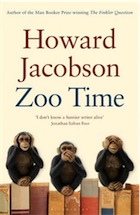Following from my last post about the intensity of listening to books on audio this is my Writer’s Note on the first of these books. This is a highly personal excercise. It is not a review; it is my note on elements that impress me as a writer and ways in which I - as a writer - can learn something from this book.
Here we go!
The writer.
Hard not to believe this is not highly autobiographical. But one can trace this
with all good writers. Enhanced by being narrated in Abelson’s first person
point of view. Whatever the the fact fiction allows witty exaggerations in all
directions and makes the novel unique.
The writing.
Highly literary even when it is being scatological. Tight complex use of syntax
to support the changes of pace and the mood of the narrator. Lots of word-play
and syntactical play showing off how the cleverness of Guy Ableman. Extremely comples
writing made trasparent making the book both human and accessible.
Central character: Guy Ableman. Probably like Jacobson, Ableman has a disputatious
mind. Abelman is highly self aware and in his narration shows us a peculiar
combination of arrogance and intellectual passive aggression. Timid on the one
hand and, on the other a writer of
impious disturbance.(His own term). He is often his own target – using full
on sexual assertions and innuendo like a naughty boy. The central theme of the story is his
obsession with both his wife and her mother:
a very original triangle.
Targets
Publishing and the writer’s life. Hilariously sharp, insightful observation of the
publishing trade – writers, editors, agents, literary festivals all fall to his
forensic wit. (Found myself saying Yes! Yes!) Has no time for people who make a
habit of being cultured, declaring that if you ‘keep people away from art and judgement they are good.’
Religion
‘Belief contains its own parody.’ – wish I’d said that!
Complex and evolving assertions
the impact of religion on identity – particularly the Jewish identity – trickle
right through the whole text, enriching it and giving it true savour.
Like Jacobso , Ableman is
often seen as mysogynistic – he has a witty take on this view of his work – he observes women closely with over-focused
adoration laced with fear. His apparent humility masks a kind of amazed
suspicion. It is a unique, not a mysogynistic view. Jacobson’s subtle prose
demonstrates Ableman’s affection for and fascination with the women in his
life. But, as Abelman says. ‘Tenderness
is a fine thing but it is not understanding.’
I have learned a lot. I think there are elements of humour in my novels
but sustaining this level of true,
meaningful comedy throughout what is essentially a serious novel takes a
special gift.

I find Jacobson very funny in person, but haven't read his books. Maybe I should. Just off to New Zealand and Cambodia and not back until March, so won't be on the blogosphere much except to do a bit of a travelogue for friends and family on the blog.
ReplyDeleteHope all is going well with you Wendy!
best wishes
Kathy
This comment has been removed by the author.
ReplyDeleteYou are my travelling icon. Have a lovely and interesting time. I am sure the New Zealanders love the new Kathleen Mansfield book. Will miss your blogging but one has to live as well as blog. I recommend Jacobson - it is a big leap from being funny in person to being funny on the page, Worth a read,
DeleteWe must catch up when you finally get back to England,
love
wxx